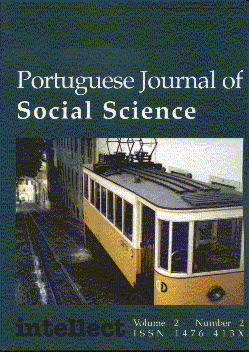ISSN 1476-413X

Dealing with intergroup conflicts in organizations: a challenge to the right of diversity (pp. 79-88)
Maria Benedicta Monteiro
The changing face of European ports as a result of their evolving use since the nineteenth century (pp. 89-103)
Henk van Dijk and Magda Avelar Pinheiro
The liberal wing of the National Assembly (1969-73): a sociological profile
(pp. 105-124)
Tiago Fernandes
Book review:
Anália Cardoso Torres (2001), Sociologia do Casamento: A Família e a
Questão Feminina, Oeiras, Celta Editora, 145 pp.
Reviewed by
Lígia Amâncio (ISCTE)
Dealing with intergroup conflicts in organizations: a challenge to the right of diversity
[Abstract]
Any group's search for a positive social identity will rely on group positive distinctiveness in comparison with significant outgroups. Turner and Brown (1978) have shown, in an intergroup setting, that high status presented a higher pattern of positive differentiation than low status groups. In this paper I will appraise how the identity and diversity dimensions of social interaction are being used in social psychological research on intergroup conflict, whether it be in organizational or in broader social settings.
The changing face of European ports as a result of their evolving use since the nineteenth century
[Abstract]
The aim of this article is to make a comparative study of the history of European ports during the last two centuries showing their complexity and specific characteristics. Whereas during the process of waterfront development, local governments emphasize the realtionship of ports with sailing ships as a marketing instrument, the industrial history of those ports are mostly neglected. This articles focuses on the industrial port, showing differences in the chronology of construction and in their urban impact. Hinterland and inland transportation were responsible for a part of those differences, as well as geographical and political circumstances. However, social aspectsas well as technological issues showed comparable evolutions. The decline of the industrial port city is a part of the general process of de-industrialization of Europe, but it has its own specific features. At least it is clear that the development of port cities during the last two centuries is far more complex than some stage theories about port development assume.
The liberal wing of the National Assembley (1969-73): a sociological profile
[Abstract]
The liberal wing was a group of deputies constituting a reformist, pro-democracy sector of the internal semi-opposition to the authoritarian New State regime during its final years. I have used a prosopographic study of all the deputies in this legislature in an attempt to draw a sociological profile of this group of deputies and to formulate some theories as to its historical genesis and recruitment channels.